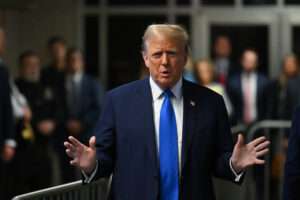The Volokh Conspiracy
Mostly law professors | Sometimes contrarian | Often libertarian | Always independent
Cato Institute President Peter Goettler on Why Trump is no Libertarian
He also explains how the same is true of the current leadership of the Libertarian Party.

In a recent Washington Post op ed, Cato Institute President Peter Goettler (the head of the nation's leading libertarian think tank) explains why Donald Trump is no libertarian. Much of this should be obvious, but many people (including some libertarians) tend to ignore it:
It will be the first time in U.S. history that a presidential candidate of a rival party will address the convention of a party that is presumably gathering to nominate its own candidate. And this strange turn of events has many libertarians scratching their heads…
[T]he list of Trump policies and postures that libertarians oppose is long and dangerous. He allowed government spending and debt to continue to spiral upward, increasing the national debt by $8.4 trillion. Federal outlays soared from $4 trillion his first year (2017) to $6.8 trillion in his last year. He persists in railing against immigration and free trade, supports further expansion of presidential power and seeks to crack down on political enemies….
Of course, both the Republican and Democratic parties share an addiction to executive power. And neither is above using extralegal means to accomplish policy objectives, as demonstrated by President Biden's brazen efforts to cancel student loan debt. And, of course, the supreme example is the Capitol riot of Jan. 6, 2021, a tragic event that celebrated a total disregard for the peaceful transfer of power and constitutional order. Libertarians know that the Constitution and the rule of law are essential elements in keeping government power constrained.
This list of Trump's anti-libertarian policies could easily be extended. For example, he advocates imposing the death penalty on drug dealers, and wants to transform the War on Drugs into a real war by attacking Mexico. Few issues define libertarianism so clearly as opposition to the War on Drugs.
As Goettler also points out, the current leadership of the Libertarian Party (which invited Trump to address their convention) isn't libertarian, either:
[T]oday's party leadership has been taken over by a faction that places it well outside the bounds of libertarianism altogether and appears comfortable with right-wing authoritarianism. Some tweets issued from state libertarian parties and other libertarian operators can only be described as shockingly racist or antisemitic — the Libertarian Party of Michigan, for instance, posted a cartoon portraying Jews as puppet masters of the Democratic and Republican parties — and would be more welcome on the alt-right than among true libertarians.
This situation arose because in 2022, the Party was taken over by the right-wing populist "Mises Caucus," which effectively exploited flaws in party rules. Many members and donors have fled the party since then, bringing it to its weakest state in decades.
The Libertarian Party has never represented more than a minority of American libertarians. Many stayed away because of factional ideological disputes or because they believed third party politics is likely to be ineffective in an electoral system heavily tilted towards the two major parties. I myself was skeptical of the LP for a combination of both those reasons. But the right-wing populist takeover has alienated the Party from most of the broader libertarian community far more than was ever the case previously.
I don't agree with every point in Goettler's article. For example, I think he is probably overoptimistic about trends in public opinion. While it is moving in a more libertarian direction on some issues, the opposite is true on many others. I also do not believe libertarians should support a broad reduction in the nation's involvement in "foreign affairs." Doing so would, I think, increase the influence of authoritarian states like China and Russia, thereby actually weakening prospects for liberty in much of the world. This is a longstanding divergence between my views and that of many other libertarians.
Be that as it may, Goettler does an excellent job of outlining Trump's flaws and those of the current Libertarian Party leadership. Neither deserves the support of people with any genuine commitment to liberty.
NOTE: As my bio at this site states, I am the Simon Chair in Constitutional Studies at the Cato Institute, as well as a professor at George Mason University. If readers believe I am biased in favor of Peter Goettler's views because of this connection, they are welcome to do so. But everything said above is consistent with views I have expressed for many years, including long before I became the Simon Chair at Cato in late 2022.


Show Comments (58)